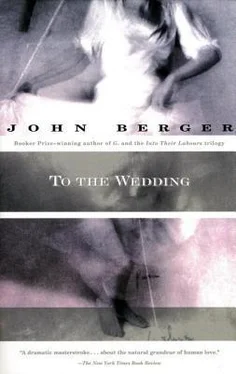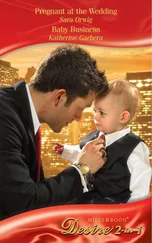John Berger - To the Wedding
Здесь есть возможность читать онлайн «John Berger - To the Wedding» весь текст электронной книги совершенно бесплатно (целиком полную версию без сокращений). В некоторых случаях можно слушать аудио, скачать через торрент в формате fb2 и присутствует краткое содержание. Год выпуска: 2011, ISBN: 2011, Издательство: Knopf Doubleday Publishing Group, Жанр: Современная проза, на английском языке. Описание произведения, (предисловие) а так же отзывы посетителей доступны на портале библиотеки ЛибКат.
- Название:To the Wedding
- Автор:
- Издательство:Knopf Doubleday Publishing Group
- Жанр:
- Год:2011
- ISBN:978-0-307-79420-8
- Рейтинг книги:3 / 5. Голосов: 1
-
Избранное:Добавить в избранное
- Отзывы:
-
Ваша оценка:
- 60
- 1
- 2
- 3
- 4
- 5
To the Wedding: краткое содержание, описание и аннотация
Предлагаем к чтению аннотацию, описание, краткое содержание или предисловие (зависит от того, что написал сам автор книги «To the Wedding»). Если вы не нашли необходимую информацию о книге — напишите в комментариях, мы постараемся отыскать её.
To the Wedding — читать онлайн бесплатно полную книгу (весь текст) целиком
Ниже представлен текст книги, разбитый по страницам. Система сохранения места последней прочитанной страницы, позволяет с удобством читать онлайн бесплатно книгу «To the Wedding», без необходимости каждый раз заново искать на чём Вы остановились. Поставьте закладку, и сможете в любой момент перейти на страницу, на которой закончили чтение.
Интервал:
Закладка:
If only I could take her place, whispers Zdena to Jean.
The ones who make their way to the open sea reach the Atlantic and swim across the ocean to the Sea of Sargasso, which is deeper than anybody knows, and on the ocean bed there, they lay their eggs and the male eels fertilise them.
Ninon suddenly laughs at a joke Emanuela has told her. She laughs as if laughing is the joke, and the joke is spinning the world round faster and faster so that only the joke holds and doesn’t go dizzy and gets bigger and bigger like a man’s prick, and throws off light and flecks of laughter and grains of sugar and with its head back swallows vino spumante, and plays with the bubbles and gives them to every comer with a kiss when they join her laughter.
The little eels start their long journey home, says Scoto. It takes them two, three, perhaps four years. And when they arrive here, Signora, they’re still no larger than one inch of shoelace!
And the parent eels? asks Jean.
Dead in the Sargasso Sea. The little ones come back alone.
I can’t believe it, says Zdena.
Again she hears her daughter laughing. Zdena lets her head fall back abruptly. Beyond the branches of the apple tree above her, there is the dazzle of the sky and, for one brief instant, without understanding anything, Zdena is happy.
I propose a toast, announces Federico, getting to his feet, a toast to our children’s happiness.
Happiness, Scoto says, come here happiness!
Then they will eat the meat. The sea, which farther south becomes my Aegean, is calm. Imperceptibly between the fingers of the Po’s hands, the sea slips into the lagoon where the inhabitants fish for mussels and where the shallow waters once drove sailors crazy with the desire to leave this swamp and sail across the world. The lagoon is lapping the dyke which protects some scattered houses, the church and the village square with the bench by the bus stop. From the church tower you’d smell the meat roasting. Lower than the square and far lower than the lagoon is the orchard of three apple trees beside the house. Beyond the house is the grass basement where the vans are parked and where Roberto and Gino are carving the lamb. I hear a knife being sharpened and men’s laughter. The smell of the fire hangs everywhere. Around the table in the orchard the women guests in their finery and the men in their shoes of softest leather sit or stroll or loll, yet all of them are in orbit round the bride. She doesn’t let them go, or they don’t let her go? As with a player on a stage it is hard to know which; both are true. And her dress glimmers amongst the boughs of the apple trees.
Roberto and Gino will carry the meat, sliced and served on boards as square as an arm is long, into the orchard. Their faces are stained and streaky. With the eating of the meat something changes at the feast, a last formality gives way to something older. Rose pink, infiltrated with garlic, heady with thyme and wood smoke, the lamb has an animal taste of young flesh and fresh cropped grasses.
Eat for a lifetime! Ninon will sing out. Gino and I, we went to the mountains together, we want the one there, we said, the one with the black nose, because we’d felt her with our hands, that’s our lamb! Where has Roberto gone? Drink to Roberto who has cooked for us!
Roberto kisses the bride, holding his blackened hands behind his back so as not to dirty her dress.
Everyone at the table in the orchard sits down to eat. With the meat they will drink the dark wine of Barolo. The guests start to touch each other more often, the jokes pass quicker. When somebody forgets, somebody else remembers for him or her. They hold hands when they laugh. Some take off things they were wearing before — a tie, a scarf, a jacket, a pair of sandals which have become too tight. The cutlets on the board demand to be picked up and stripped clean with the teeth. Everybody shares.
The wedding guests are becoming a single animal who has fed well. A strange creature to find in a widow’s orchard, a creature half mythical, like a satyr with thirty heads or more. Probably as old as man’s discovery of fire, this creature never lives more than a day or two and is only reborn when there’s something more to celebrate. Which is why feasts are rare. For those who become the creature, it’s important to find a name to which it answers whilst alive, for only then can they recall, in their memory afterwards, how, for a while, they lost themselves in its happiness.
Luca will fetch the wedding cake from his van. It has five tiers and is decorated with sprays of orange blossom in icings of three colours. Written in moon-silver on the topmost face is the name: GINON.
Only five letters, he says, and you’re both there! I suddenly saw it when I finished doing the flowers. Do you know what I’m going to do, Mimi? I said. I’m going to write GINON. The two of you in one!
And this becomes forever the name of the thirty-headed creature in the orchard.
Ninon will offer a slice of the cake to everyone who has come to the wedding, offer it herself. They will make a wish, they will remember, they will relish the sweetness of it. On each piece there are sugared petals of orange blossom.
She carries the plate high against her bosom. Before each guest she stops, says nothing, smiles and lowers her eyelids with their long lashes so that the guest has the impression the bride has inclined her head. Behind the plate she is holding, the white buttons of the bodice of her dress tug in their little nooses of white cotton. The top three have come undone.
The thirty braids on her head, which bob up and down and gyrate as she walks, have taken so much patience and time to plait that she proposes to let Gino only undo one a night after they are married. Each night they will choose which little lock.
On her left hand she is wearing the turtle ring from Africa, and today the turtle is coming home, swimming towards her, his head pointing to her wrist. On her right hand is the wedding ring which has never been worn, which Gino slipped on to her finger five hours ago, and which she will die with on her hand.
Gradually everyone stops talking as they watch her. Her gait is so light and at the same time so solemn.
I’m leaving you, the poetess Anyte said, I’m leaving you, across my eyes death draws his black scarf, it is dark where I’m going.
The kids come out of school. Several tear across the square to look down into the orchard.
They’re still at it!
The bride has taken off her thingamajig! See him — the one there on the grass — he’s drunk.
At weddings there’s always people who go drunk, they wait for the excuse, my mum says.
When I get married I’m going to—
What’s she doing?
When you get married! First you have to find a boy big enough—
She’s waving to us.
She’s telling us to come down.
They tumble down the bank, yelling and laughing. When Ninon approaches them with the plate, they become a little shy. They take a piece — yet are not sure whether to eat it now or keep it for later.
Eat! orders Federico, it’s the best you’ll taste in your lifetime.
Chico, who is twelve and the son of the Fiat garage man, stares at her so intently that he forgets to lift his hand and take a slice.
What, his eyes are asking, what is she underneath? He has never been so close to a bride before. What is she underneath? Is she the same every day? She is already half undressed. Or is she different, never the same twice? He knows how they fuck, there is nothing mysterious, he has seen enough strip cartoons, but she’s so small, she’s scarcely bigger than him and the mystery is on her skin, it shines and comes from her legs and her body and her face and her strange hair and the million things she can do with them. It shines and glistens and has a temperature and a smell and all the time it changes with the expression of her eyes and with what her fingers are touching when they touch. To the man she marries she is going to give something. If he shuts his eyes he can guess what. It’s not what you feel with the girls, when you put your finger there. If he shuts his eyes, he can guess. She’s going to give him a secret which is the bride. All the soldiers know every bride is the same. Minas dressed up, about to give their secrets to men in the big marriage beds. The thing is, each secret is a secret which nobody can guess with their eyes open. So it goes on. All of her is the secret and the secret is sweet and warm, with nothing between grazing, nothing keeping them apart and everything underneath helping. Pure like orange flowers, the bride’s secret, tasting of sugar. In the tree underneath the dress, which is undone, a little bird is telling what?
Читать дальшеИнтервал:
Закладка:
Похожие книги на «To the Wedding»
Представляем Вашему вниманию похожие книги на «To the Wedding» списком для выбора. Мы отобрали схожую по названию и смыслу литературу в надежде предоставить читателям больше вариантов отыскать новые, интересные, ещё непрочитанные произведения.
Обсуждение, отзывы о книге «To the Wedding» и просто собственные мнения читателей. Оставьте ваши комментарии, напишите, что Вы думаете о произведении, его смысле или главных героях. Укажите что конкретно понравилось, а что нет, и почему Вы так считаете.












